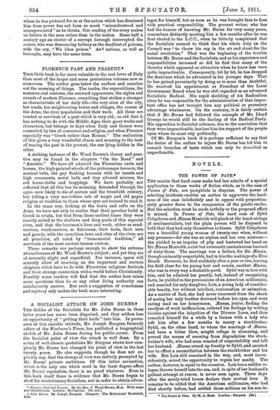FLORENCE PAST AND PRESENT.* THIS little book is far more
valuable to the real lover of Italy than most of the larger and more pretentious volumes now so numerous. The author goes below the surface and searches out the meaning of things. The trades, the superstitions, the manners and customs, the outward appearance, the sights and sounds of modern Florence, everything that strikes a stranger as characteristic of her daily life—the very sites of the city, her roads, her neighbouring towns and villages, the course of the Arno, the river population and their work. All these are treated as survivals of a past which is very old ; so old that it has nothing to do with the Middle Agea, their great works and characters, but belongs to days when Italy and Greece were connected by ties of commerce and religion, and when Florence especially was "Greek rather than Roman." The realization of this gives a very wonderful charm and meaning to the task of tracing the past in the present, the one lying hidden in the other.
A striking instance of Mr. Wood Brown's theory and prac- tice may be found in the chapters "On the Road" and "Amulets." We have all admired the Florentine carts and horses, the high-painted wheels of the picturesque baroccio, the musical bells, the gay flashing harness with its tassels and high ornaments, metal balls and tiny silvered mirrors, the red horse-cloths and trappings. We have probably not reflected that all this has its meaning, descended through the ages—now likely to die of motors and the twentieth century, but telling a very marvellous tale of magic and old pagan religion or tradition to those whose eyes are trained to read it.
In the same way, looking at the boats and rafts on the Arno, we have not only to realize that their peculiar build is Greek in origin, but that from those earliest times they were exactly suited to the shallows and deep pools of this especial river, and that the boatmen's lives and work, either as sand- carriers, wood-carriers, or fishermen, their tools, their nets and gourds, with the unwritten laws and rites of the river, are all primitive, all ruled by "immemorial tradition," all survivals of the most ancient human custom.
These remarks are perhaps enough to show the extreme attractiveness of Mr. Wood Brown's subject ; and yet they are of necessity slight and superficial. For instance, space will scarcely allow of touching on the important and curious chapters which have to do with Florentine religious festivals and their strange connection with a world before Christianity. Possibly some readers will find that the author here raises more questions than he or any other living authority can satisfactorily answer. But such a suggestion of remoteness and mystery only makes the book more interesting.






































 Previous page
Previous page